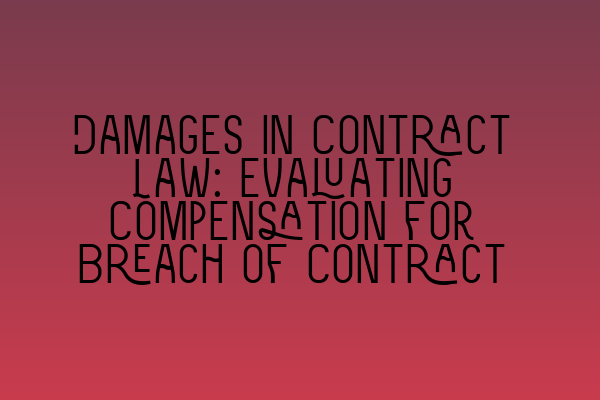Damages in Contract Law: Evaluating Compensation for Breach of Contract
When entering into a contract, parties expect that the agreed-upon terms will be fulfilled. However, there are instances where one party fails to perform their obligations, resulting in a breach of contract. In such cases, the injured party may be entitled to seek damages as a form of compensation.
Damages refer to the monetary compensation awarded to the non-breaching party in order to restore them to the position they would have been in, had the contract been properly performed. Evaluating damages involves assessing the losses suffered by the innocent party and determining the appropriate compensation they should receive.
1. Types of Damages:
There are several types of damages that can be claimed in contract law. These include:
a. Compensatory Damages: This type of damages aims to place the injured party in the position they would have been in if the contract had been fulfilled. It covers both actual or direct losses as well as consequential or indirect losses that result from the breach. Calculating compensatory damages requires a thorough analysis of the financial impact suffered by the claimant.
b. Nominal Damages: When the claimant has not suffered any actual financial loss, but their rights have been infringed, nominal damages may be awarded. This serves as a symbolic recognition of the breach and can help maintain the principle of upholding contractual obligations.
c. Liquidated Damages: In some contracts, the parties may agree in advance on the amount of damages to be paid in case of a breach. These are referred to as liquidated damages and provide certainty and predictability in determining the compensation.
d. Punitive Damages: Unlike compensatory damages, punitive damages are not intended to compensate the injured party. Instead, they aim to punish the breaching party for their willful or malicious conduct, deterring them and others from engaging in similar behavior. However, punitive damages are not typically awarded in contract cases, as the focus is primarily on compensating the injured party.
2. Assessing Damages:
When evaluating damages in a breach of contract case, various factors need to be taken into consideration. These include:
a. Direct Losses: The first step in assessing damages is to determine the direct financial impact of the breach. This may include the cost of rectifying the breach, such as replacing defective goods or performing the necessary repairs. Additionally, any loss of profits directly resulting from the breach should also be considered.
b. Consequential Losses: Consequential losses refer to the indirect losses that stem from the breach and are beyond the immediate scope of the contract. For example, if a supplier fails to deliver goods as agreed, the buyer may incur losses due to delays in their own manufacturing process. Evaluating the potential consequential losses requires a careful analysis of the specific circumstances and the relationship between the parties.
c. Mitigation: The claimant has a duty to mitigate their losses, meaning they must take reasonable steps to minimize the damages. Failure to do so may result in a reduction of the amount of compensation awarded. Therefore, it is crucial for the injured party to demonstrate that they have made efforts to mitigate their losses and limit their financial impact.
3. Seeking Legal Advice:
Determining the appropriate amount of damages in a breach of contract case can be complex. It requires a thorough understanding of contract law principles, relevant case law, and the specific circumstances of the case. As such, it is advisable for individuals and businesses to seek legal advice from experienced contract law solicitors.
At SQE Contract Law, our team of expert solicitors are well-versed in all aspects of contract law, including damages assessment. We understand the importance of evaluating compensation accurately and providing effective representation to our clients.
If you are preparing for the SQE 1 or SQE 2 exams, our practice exam questions and preparation courses can help you develop a comprehensive understanding of contract law concepts, including damages assessment. You can also check out our SQE exam dates to plan your study schedule effectively.
In conclusion, damages in contract law serve as compensation for the innocent party in the event of a breach. Understanding the different types of damages and the factors involved in evaluating them is essential for both solicitors and individuals involved in contract disputes. Seeking legal advice and relying on experienced professionals can greatly assist in navigating the complexities of damages assessment successfully.
Sources:
– SQE 1 Practice Mocks FLK1 FLK2
– SQE 2 Preparation Courses
– SQE 1 Preparation Courses
– SRA SQE Exam Dates
